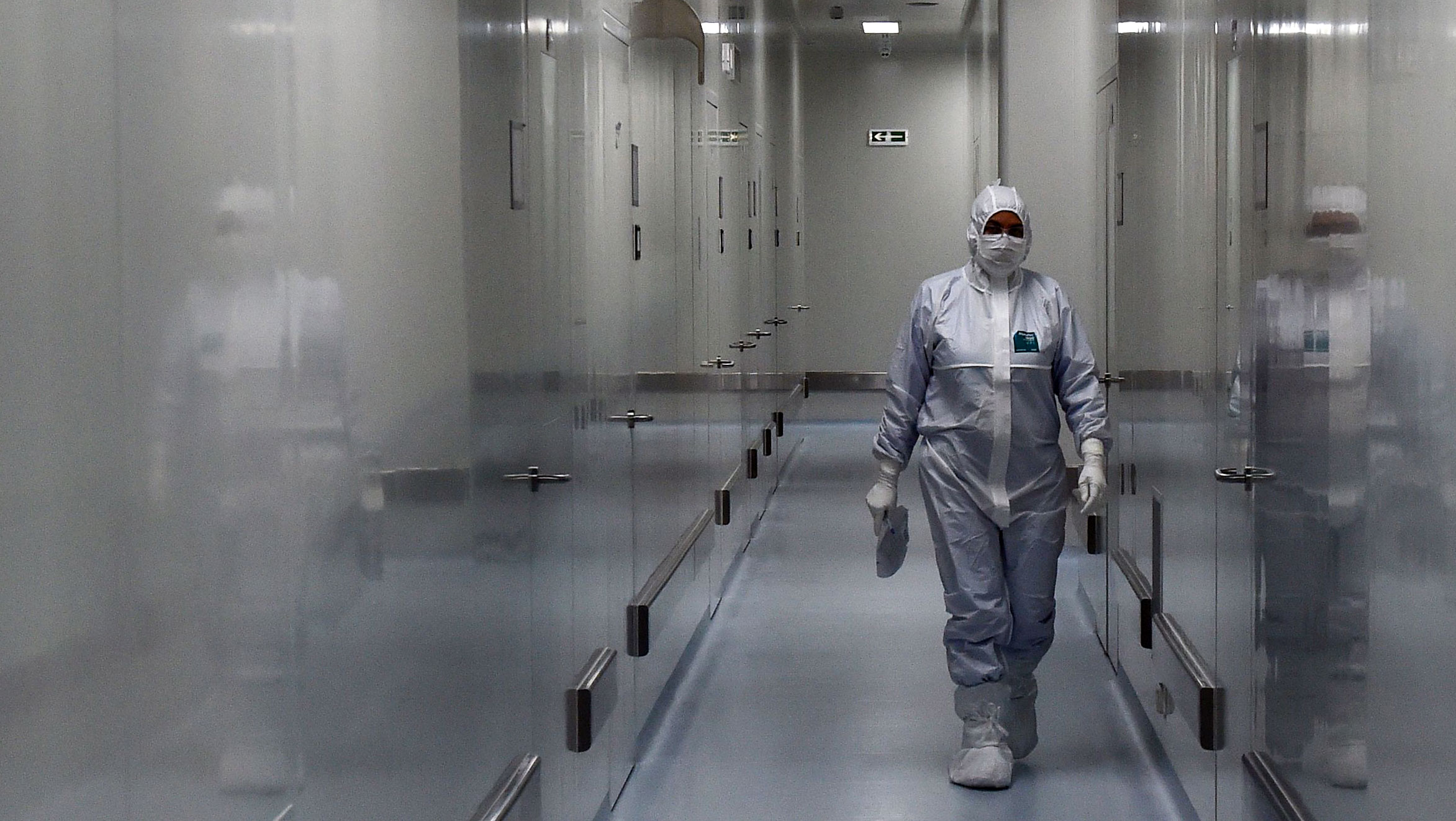Coronavirus: Oxford vaccine shows ‘encouraging’ results
UK-made vaccine joins list of potential pandemic-ending vaccines

A free daily email with the biggest news stories of the day – and the best features from TheWeek.com
You are now subscribed
Your newsletter sign-up was successful
The Oxford Covid vaccine has shown a strong immune response in adults in their 60s and 70s, further boosting hopes that a successful vaccine could be just around the corner.
Researchers say phase two findings, based on 560 healthy adult volunteers, are “encouraging”, the BBC reports. Larger trials to establish whether the immune response stops people developing Covid-19 are expected to deliver results in the next few weeks.
Two other vaccines - one develope by Pfizer and BioNTech and another by Moderna - have already demonstrated effective protection.
The Week
Escape your echo chamber. Get the facts behind the news, plus analysis from multiple perspectives.

Sign up for The Week's Free Newsletters
From our morning news briefing to a weekly Good News Newsletter, get the best of The Week delivered directly to your inbox.
From our morning news briefing to a weekly Good News Newsletter, get the best of The Week delivered directly to your inbox.
Oxford Vaccine Group, University of Oxford
The Oxford Covid vaccine, long thought to be one of the leading Covid-19 candidates, has been found to trigger a robust immune response in healthy adults aged 56 to 69 and over 70, two of the most vulnerable demographics.
The trial demonstrated similar immune responses across all three age groups studied: 18 to 55, 56 to 69 and 70 and over.
The drug is based on an adenovirus - a mild virus found in chimpanzees - which has been modified to carry a spike protein from the new coronavirus. Harmless in isolation, it will prime the immune system to fight off similar proteins, allowing it to defend itself against Covid-19.
A free daily email with the biggest news stories of the day – and the best features from TheWeek.com
“We anticipate efficacy read-outs from phase 2/3 trials between now and the end of the year,” a spokesperson for manufacturer AstraZeneca said. “If approved within countries, doses of the potential vaccine could be available for use before the end of the year.”
Moderna vaccine
In an interim analysis published on Monday, US pharmaceutical firm Moderna revealed that its vaccine has an efficacy of 94.5%.
The results showed that only five of the 95 subjects who tested positive during trials had been given the vaccine, compared with 90 who had not been given any treatment.
There were around 30,000 people in the study in total, each receiving either two doses of the jab or two placebos.
Moderna will now apply to the US regulator, the Food and Drug Administration, for emergency-use authorisation in the coming weeks, The Guardian says.
Moderna also said that the vaccine has been shown to last for up to 30 days in household fridges and at room temperature for up to 12 hours. This suggests it can be “stored and transported much more easily than a Pfizer/BioNTech vaccine”, Sky News reports.
It also remains stable at -20C, equal to most household or medical freezers, for up to six months.
Pfizer vaccine
The German firm Pfizer, which hopes to have a vaccine out by Christmas, had earlier predicted a working vaccine by the end of October.
Despite missing this deadline, the company has taken a significant lead in the race to develop a vaccine with the announcement that the first interim results in large-scale trials show the treatment is 90% effective.
According to The Guardian, the firm’s analysis “shows a much better performance than most experts had hoped for and brings into view a potential end” to the pandemic.
The paper adds that the company has claimed that there have been “no serious side-effects while the high percentage of those protected makes the findings especially compelling”.
The vaccine has been tested on 43,500 people in six countries, with no safety concerns having been raised. The developers described it as a "great day for science and humanity".
BCG vaccine
Scientists in India say the Bacillus Calmette-Guérin (BCG) vaccine, which primarily provides protection against tuberculosis (TB), is also beneficial against coronavirus disease (Covid-19) among elderly people.
This vaccination has long been known to “enhance the innate immune response” to a range of other infections, including viruses that attack the respiratory system, says a research article published in The Lancet.
As trials were held in the Netherlands and Australia to evaluate its performance, a paper in the journal Nature, Professor Mihai Netea, who is leading the Dutch research, said that even if BCG doesn’t offer comprehensive protection against the coronavirus, it “may well be a bridge to a specific Covid-19 vaccine”.
Chinese vaccines
State media in China says hundreds of thousands of people have already received Covid-19 vaccine shots.
“Beijing’s government, including its military and several state-backed firms, has committed hundreds of millions of dollars and cleared regulatory barriers to accelerate research and development,” The Wall Street Journal says.
The result is no fewer than five potential vaccines. All use the traditional approach of injecting a weakened or deactivated virus to stimulate immunity.
Any found to be effective will be widely distributed within China and around the world, the government says - but Beijing may face some reluctance from overseas buyers.
“China has suffered from years of scandals – counterfeits run rampant and expired vaccines have been tampered with and repackaged,” The Telegraph reports. “Poor refrigeration in storage and transport have also ruined vaccines.” Even among Chinese consumers, the newspaper adds, “those who can afford it opt for imported over domestic vaccines”.
Holden Frith is The Week’s digital director. He also makes regular appearances on “The Week Unwrapped”, speaking about subjects as diverse as vaccine development and bionic bomb-sniffing locusts. He joined The Week in 2013, spending five years editing the magazine’s website. Before that, he was deputy digital editor at The Sunday Times. He has also been TheTimes.co.uk’s technology editor and the launch editor of Wired magazine’s UK website. Holden has worked in journalism for nearly two decades, having started his professional career while completing an English literature degree at Cambridge University. He followed that with a master’s degree in journalism from Northwestern University in Chicago. A keen photographer, he also writes travel features whenever he gets the chance.
-
 How the FCC’s ‘equal time’ rule works
How the FCC’s ‘equal time’ rule worksIn the Spotlight The law is at the heart of the Colbert-CBS conflict
-
 What is the endgame in the DHS shutdown?
What is the endgame in the DHS shutdown?Today’s Big Question Democrats want to rein in ICE’s immigration crackdown
-
 ‘Poor time management isn’t just an inconvenience’
‘Poor time management isn’t just an inconvenience’Instant Opinion Opinion, comment and editorials of the day
-
 A Nipah virus outbreak in India has brought back Covid-era surveillance
A Nipah virus outbreak in India has brought back Covid-era surveillanceUnder the radar The disease can spread through animals and humans
-
 Trump HHS slashes advised child vaccinations
Trump HHS slashes advised child vaccinationsSpeed Read In a widely condemned move, the CDC will now recommend that children get vaccinated against 11 communicable diseases, not 17
-
 A fentanyl vaccine may be on the horizon
A fentanyl vaccine may be on the horizonUnder the radar Taking a serious jab at the opioid epidemic
-
 Health: Will Kennedy dismantle U.S. immunization policy?
Health: Will Kennedy dismantle U.S. immunization policy?Feature ‘America’s vaccine playbook is being rewritten by people who don’t believe in them’
-
 How dangerous is the ‘K’ strain super-flu?
How dangerous is the ‘K’ strain super-flu?The Explainer Surge in cases of new variant H3N2 flu in UK and around the world
-
 The stalled fight against HIV
The stalled fight against HIVThe Explainer Scientific advances offer hopes of a cure but ‘devastating’ foreign aid cuts leave countries battling Aids without funds
-
 Vaccine critic quietly named CDC’s No. 2 official
Vaccine critic quietly named CDC’s No. 2 officialSpeed Read Dr. Ralph Abraham joins another prominent vaccine critic, HHS Secretary Robert F. Kennedy Jr.
-
 This flu season could be worse than usual
This flu season could be worse than usualIn the spotlight A new subvariant is infecting several countries